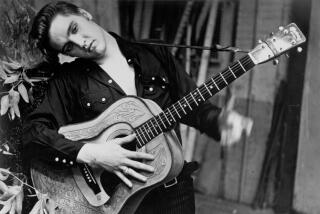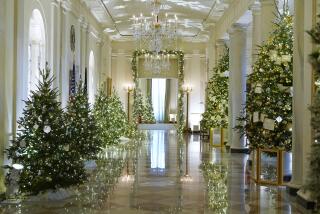A season’s greeting to ‘merry’
- Share via
A White House announcement earlier this month put an end to mounting speculation and suspense, as First Lady Laura Bush revealed that the theme of the White House Christmas decorations this year would be “A Season of Merriment and Melody.” The decorations correspond to classic Christmas songs such as “Rudolph the Red-Nosed Reindeer” and “White Christmas.”
The theme gave a boost to a word that has been lagging lately in the English language: “merry.” As with our Christmas ornaments, we pick “merry” out of our closets this time of year, blow the dust off it and put it on prominent display in anticipation of Dec. 25. After that, we put it back in a box and keep it in storage for the next 11 months.
In fact, about the only places “merry” turns up nowadays, other than “Merry Christmas,” is in phrases such as “the more the merrier,” “to make merry” and the famous quote (derived from the biblical book of Ecclesiastes) “Eat, drink and be merry, for tomorrow we die.”
“Words do tend to stick around in these fixed phrases after they’ve lost general currency, often precisely because they evoke a bygone world,” says Geoffrey Nunberg, Stanford linguist and author of “Going Nucular: Language, Politics and Culture in Confrontational Times” (PublicAffairs, 2004). “ ‘Merry Christmas’ wears its status as a traditional greeting on its sleeve and brings with it all kinds of Dickensian stereotypes of old-fashioned Christmas.”
A search for “merry” on Lexis-Nexis turns up few results that aren’t Christmas greetings, the word “merry-go-round” or the female name Merry.
The word has so much Victorian residue that it’s rare to hear it as a serious reference to the present, says Erin McKean, senior editor of U.S. dictionaries for Oxford University Press.
“No one says, unironically, ‘Have yourself a merry old time’ or ‘It was a merry party,’ ” she says.
When people do use the word this way, it’s often with a wink and a reference to eggnog. That’s the other main surviving sense of “merry”: intoxication. Reporting on one celebrity’s recent night out, the London Daily Mirror (which wishes its readers “a Mirror Christmas”) wrote the individual “was very merry and had topped up a bottle of vodka with Red Bull.”
The Oxford English Dictionary says this definition dates at least as far as John Wycliffe’s 14th century translation of 1 Samuel 25:36: “Nabal’s heart was merry within him, for he was very drunken.”
“Merry” can also mean playful mischief. People magazine’s recent profile of George Clooney called him “Hollywood’s merry prankster.” Shakespeare used the phrase “a merry jest” (though he also wrote “merry cheer”).
“ ‘Merry’ has had a long ride in English, with a much broader range of meanings than it has now,” Nunberg writes by e-mail. “At one point or another it has meant ‘brightly colored,’ ‘bright,’ ‘attractive,’ ‘pleasant’ (as in ‘a merry day’), ‘fragrant’ and ‘happy’ (which is probably what was meant by Robin Hood’s ‘merry men’).”
“Merry,” which comes from the Old English word “mirige” for “pleasant,” as does “mirth,” is not entirely obsolete. USA Today referred to Lindsay Lohan’s “merry, raspy laugh,” without reference to alcohol, pranks or the holidays.
But the word’s days are numbered, even in the phrase “Merry Christmas,” McKean says. “I think ‘Merry Christmas’ is on its way to becoming a fossilized phrase, almost idiomatic. Think how it’s funny or cute to say ‘Happy Christmas!’ instead.”
It’s becoming increasingly common to hear people use the phrase “Happy Holidays.” Not only does it sounds less archaic, it’s also the safest option when you don’t know which holiday someone is celebrating.
Laura Bush stuck with “happy holidays” in her greeting to reporters recently, even as she discussed the theme “Merriment and Melody.” In closing, she repeated, “Happy holidays, everybody.” But one reporter responded, “Merry Christmas.” “Merry Christmas,” she replied.
*
This article originally appeared in the Chicago Tribune.
More to Read
Sign up for our Book Club newsletter
Get the latest news, events and more from the Los Angeles Times Book Club, and help us get L.A. reading and talking.
You may occasionally receive promotional content from the Los Angeles Times.







